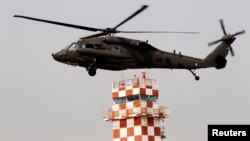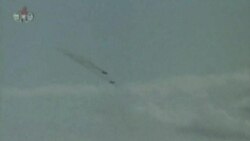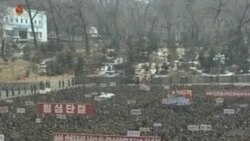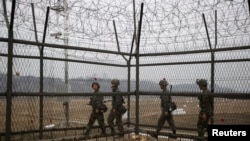The United States expects North Korea will launch one of its missiles in the coming days.
Defense Department officials told VOA they have been preparing for the possibility of a North Korean missile launch and are taking Pyongyang's threats seriously.
North Korea said Thursday that its military has been given final approval for a nuclear attack against the United States - a threat that most analysts think Pyongyang would be unable to carry out.
Related video report by Luis Ramirez:
South Korea said it has confirmed the North has moved one of its missiles to the country's east coast, and Defense Minister Kim Kwan-Jin said while the missile appears to have "considerable range," it is unlikely it could reach the U.S. mainland.
"Looking at the missile's range, it doesn't look like it will be able to reach the American continent," he said.
South Korea's semi-official news agency quotes officials in Seoul as saying the missile is likely the Musudan (also known as the BM-25), a ground-launched rocket 12-19 meters long that can carry a conventional 1,200-kilogram bomb. It could potentially carry a nuclear warhead, but security analysts think that, too, is beyond North Korea's current capabilities.
The Musudan has a range of about 3,000 kilometers - far enough to hit South Korea or Japan.
U.S. Defense Secretary Chuck Hagel says the Pentagon is treating the threats seriously. On Wednesday, a Pentagon official said the United States will soon deploy an advanced missile defense system to the island of Guam, a U.S. Pacific territory, as a precautionary move.
U.S. State Department spokeswoman Victoria Nuland said Thursday North Korea's most recent threats did not come as a surprise.
"This is just the latest in a long line of aggresive statements," she said. "These are only going to serve to further isolate the DPRK and make it harder for the international communiyt to work with them. But they have a different choice. They have a different choice and they're not choosing to take it."
Pyongyang, which is angry about recent United Nations sanctions against its nuclear program, has issued near-daily threats against Seoul and Washington, as well as Japan.
North Korean state-run television Thursday showed more mass rallies against the U.S.
Japan's chief cabinet secretary said Japan is in close cooperation with Washington and Seoul.
Related video report by Zlatica Hoke He said, "Japan will not be pushed around by North Korea's provocations and will continue to work together with relating countries to comply with U.N. Security Council resolutions. We strongly urge North Korea that it's not in their interests to take further provocative actions."
Russian Foreign Ministry spokesman Alexander Lukashevich urged North Korea to tone down the rhetoric and return to diplomacy.
He said, "This radically complicates, if it doesn't in practice shut off, the prospects for resuming six-party talks to resolve the nuclear issue on the Korean peninsula."
Also Thursday the future of a joint industrial complex between North and South Korea remained in question, as Pyongyang blocked South Korean workers from entering the center for a second day.
In Seoul, VOA's Steve Herman said more than 600 South Koreans spent the night at the Kaesong industrial complex, after about 200 returned home Thursday. Six Chinese nationals are also stranded there.
The Kaesong industrial zone, about 10 kilometers inside North Korea, is an important source of income for cash-strapped Pyongyang.
North Korea has responded furiously to tough U.N. sanctions meant to punish Pyongyang for its third nuclear test in February and its satellite launch in December. It is also upset at ongoing annual U.S.-South Korea military drills.
Related slide show
Defense Department officials told VOA they have been preparing for the possibility of a North Korean missile launch and are taking Pyongyang's threats seriously.
North Korea said Thursday that its military has been given final approval for a nuclear attack against the United States - a threat that most analysts think Pyongyang would be unable to carry out.
Related video report by Luis Ramirez:
South Korea said it has confirmed the North has moved one of its missiles to the country's east coast, and Defense Minister Kim Kwan-Jin said while the missile appears to have "considerable range," it is unlikely it could reach the U.S. mainland.
"Looking at the missile's range, it doesn't look like it will be able to reach the American continent," he said.
Tensions Rising on Korean Peninsula
Tensions Rising on Korean Peninsula- February 12: North Korea carries out third nuclear test
- March 27: North Korea cuts military hotline with South Korea
- March 28: U.S. B-2 bombers fly over Korean peninsula
- March 30: North Korea says it has entered a "state of war" with South Korea
- April 3: North Korea blocks South Korean workers from Kaesong
- April 4: North Korea moves a missile to its east coast
- April 9: North Korea urges foreigners to leave the South. The U.S. and South Korea raise alert level
- April 14: US Secretary of State John Kerry offers talks with Pyongyang if it moves to scrap nuclear weapons
- April 16: North Korea issues threats after anti-Pyongyang protests in Seoul
- April 29: North Korea holds back seven South Koreans at Kaesong
- April 30: North Korea sentences American to 15 years hard labor for hostile acts
- May 20: North Korea fires projectiles for a consecutive third day
- May 24: North Korean envoy wraps up China visit for talks on Korean tensions
- June 7: South Korea accepts Pyongyang's offer of talks on Kaesong and other issues
The Musudan has a range of about 3,000 kilometers - far enough to hit South Korea or Japan.
U.S. Defense Secretary Chuck Hagel says the Pentagon is treating the threats seriously. On Wednesday, a Pentagon official said the United States will soon deploy an advanced missile defense system to the island of Guam, a U.S. Pacific territory, as a precautionary move.
U.S. State Department spokeswoman Victoria Nuland said Thursday North Korea's most recent threats did not come as a surprise.
"This is just the latest in a long line of aggresive statements," she said. "These are only going to serve to further isolate the DPRK and make it harder for the international communiyt to work with them. But they have a different choice. They have a different choice and they're not choosing to take it."
Pyongyang, which is angry about recent United Nations sanctions against its nuclear program, has issued near-daily threats against Seoul and Washington, as well as Japan.
North Korean state-run television Thursday showed more mass rallies against the U.S.
Japan's chief cabinet secretary said Japan is in close cooperation with Washington and Seoul.
Related video report by Zlatica Hoke He said, "Japan will not be pushed around by North Korea's provocations and will continue to work together with relating countries to comply with U.N. Security Council resolutions. We strongly urge North Korea that it's not in their interests to take further provocative actions."
Russian Foreign Ministry spokesman Alexander Lukashevich urged North Korea to tone down the rhetoric and return to diplomacy.
He said, "This radically complicates, if it doesn't in practice shut off, the prospects for resuming six-party talks to resolve the nuclear issue on the Korean peninsula."
Also Thursday the future of a joint industrial complex between North and South Korea remained in question, as Pyongyang blocked South Korean workers from entering the center for a second day.
In Seoul, VOA's Steve Herman said more than 600 South Koreans spent the night at the Kaesong industrial complex, after about 200 returned home Thursday. Six Chinese nationals are also stranded there.
The Kaesong industrial zone, about 10 kilometers inside North Korea, is an important source of income for cash-strapped Pyongyang.
North Korea has responded furiously to tough U.N. sanctions meant to punish Pyongyang for its third nuclear test in February and its satellite launch in December. It is also upset at ongoing annual U.S.-South Korea military drills.
Related slide show
















